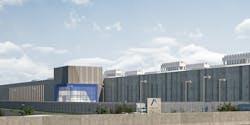Why Chicago Is a Geostrategic Destination for Data Center Investment
In this edition of Voices of the Industry, Eric Jacobs, CRO of Aligned, discusses the factors that make Chicago a prime location for data center investment.
Eric Jacobs, Chief Revenue Officer, Aligned
Chicago has long served as a major infrastructure hub for the nation’s commerce, whether goods and services were conveyed by rail, road, air, or data packet. Home to the Chicago Mercantile Exchange, one of the largest financial exchanges in the world, the Tier 1 “Second City” has also been a hotbed for high frequency trading over the past decade. More recently, a proposed tax on stocks, options, futures and swaps trading by the State of New Jersey has even led NASDAQ to relocate certain workloads to Chicago, where all 16 U.S. stock exchanges already have their disaster recovery sites.
Chicago offers a convenient, centralized location that’s equally as accessible to New York City as it is to the West Coast. When compared to Chicago, however, the cost of living is 64 percent higher in San Francisco, and 109 percent higher in Manhattan, according to the Council for Community and Economic Research. The Midwest, and Chicago in particular, has lately become a top destination for expansion by San Francisco-based tech companies. Now, as a hub for a rapidly transforming digital economy, the city’s highly skilled workforce has attracted some of the world’s largest tech firms, including Google, Salesforce and Uber, as they look to tap into the market’s immense talent pool, and at a much more affordable cost than coastal alternatives.
The Chicago metropolitan area remains an optimal region to build and operate data centers, and not surprisingly, data center providers are rediscovering the Windy City and its many advantages as a destination site. The colder climate saves money on cooling costs. There’s a low risk of natural disasters. Plus, the Chicago metropolitan area has world-class fiber infrastructure, reliable utility power, and renewable energy options. Indeed, a 2020 report from Cushman & Wakefield ranked Chicago as the second data center market in the world, right behind Ashburn, Virginia, due to its cloud availability, development pipeline, fiber connectivity, land price, market size and vacancy.
A Launchpad for Connectivity and Cloud
With respect to the needs of hyperscalers, the Chicago metro area is growing as a key launchpad for connectivity and cloud services. According to a report by JLL, in 2020, approximately 73 percent of the region’s market demand was from cloud users. Last year, several major leases resulted in entire data center assets being leased by cloud companies, leaving demand for still more capacity on a large scale as well as from enterprise and managed service provider (MSP) growth.
Additionally, just as cloud companies started looking to overcome the challenges of application latency and performance by moving to global metro markets in vicinity of their clients, closer to where data is generated, utilized, or consumed, Illinois joined 30 other states with tax incentives specifically targeted at attracting data centers.
Passed in late 2019, the Illinois Data Centers Investment Program exempts data centers and their occupants from state and local sales tax on data center equipment purchases, which will generate significant savings for hyperscaler, cloud and multinational enterprise customers. As Illinois Governor JB Pritzker stated at the time, “In today’s world, data centers are as critical a part of our infrastructure as our roads, trains and schools.”
Data center owner-operators, hyperscalers, social media giants and cloud providers alike are recognizing the increasing significance of the Chicago market, as reflected in a flurry of activity in the second half of 2020. Facebook is also expanding its operations and AWS will go online with a new Local Zone in Chicago this year, the better to serve those applications that benefit from the extremely low latency made possible by geographic proximity.
At Aligned, Chicago has always been a data center market that’s been on our radar, not only because it is Tier 1, but also due to an ideal climate for the deployment of a waterless data center alongside its convergence of metro, long haul and international fiber networks. So when a critical piece of land presented itself, thanks to our capital partnerships and the due diligence that was already completed, we moved swiftly to secure the location and begin construction. Located at 505 Northwest Avenue in Northlake, locals will know the address as the former site of the Chicago Tribune Media Group’s printing operations.
Among those in our industry, it’s been said that one of the lessons of the past 18 months, challenging as they were, was that data centers were finally recognized as essential pillars of the economy. Just as Chicago has always benefited from being a robust regional, national and international physical transportation hub, it is now well established as a vibrant information transport hub. This makes Chicago a geostrategic destination for data center investment that no competitive organization would want to ignore.
Eric Jacobs is the chief revenue officer of Aligned. Learn more about their colocation and Build-to-Scale solutions by contacting them.



